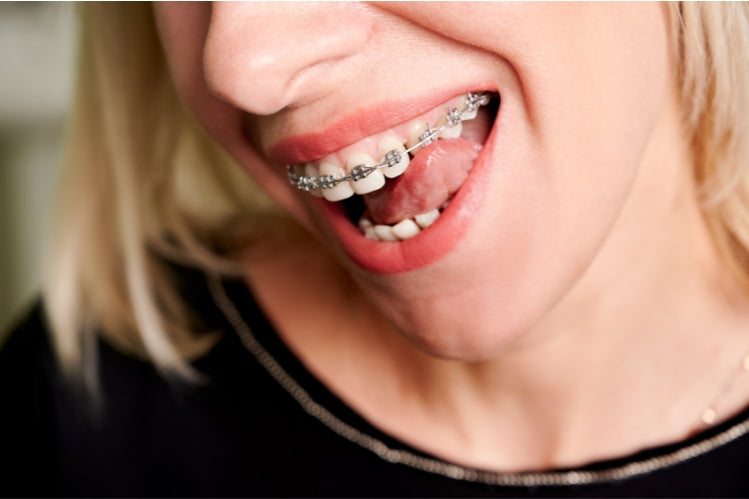Table of contents
Metal braces are the most common type of orthodontic treatment, effectively straightening teeth and improving smiles for decades. However, it's natural to have concerns before starting any dental procedure. While metal braces are generally safe, there can be some minor risks and discomforts associated with them. Let's delve into what you can expect during metal brace treatment.
How Metal Braces Work
Metal braces function by applying gentle, constant pressure to your teeth, gradually shifting them into their desired positions. The braces consist of:
- Brackets: Small metal squares bonded to the front of each tooth.
- Archwire: A thin metal wire threaded through the brackets, exerting pressure on the teeth.
- Ligatures: Tiny elastic bands that hold the archwire in place.
- Potential Risks and Discomforts of Metal Braces
While metal braces are a well-established treatment, there can be some downsides to consider:
Discomfort
During the initial adjustment period and after tightening appointments, your teeth might feel sore or tender. This discomfort usually subsides within a few days. Over-the-counter pain relievers can help manage it.
Disrupted Eating
Certain foods can damage or become stuck in your braces. You'll need to avoid hard, chewy, or sticky foods like nuts, candy, and pretzels. This can be a temporary inconvenience, but it promotes healthy eating habits and ensures your braces stay intact.
Mouth Irritation
The brackets and wires can irritate your inner cheeks and lips, especially during the initial stages. Orthodontists recommend using orthodontic wax to create a barrier and alleviate irritation.
Difficulties with Oral Hygiene
Maintaining proper oral hygiene is crucial during metal brace treatment. Food particles can get trapped around the brackets, increasing your risk of cavities and gum disease. Brushing and flossing more diligently is essential.
Allergic Reactions
In rare cases, individuals might develop allergic reactions to the nickel present in some metal braces. If you experience persistent itching or swelling around the brackets, consult your orthodontist.
Longer Treatment Time
Compared to newer options like clear aligners, metal braces may require a longer treatment duration, typically ranging from 12 to 24 months.
Important Considerations Before Getting Metal Braces
Discuss Your Concerns
Open communication with your orthodontist is key. Discuss any anxieties you have about metal braces and ensure they address all your questions thoroughly.
Alternative Treatments
Explore other orthodontic options like clear aligners if aesthetics or treatment time are significant concerns. However, metal braces remain the most effective choice for certain complex orthodontic cases.
Commitment to Oral Hygiene
Maintaining good oral hygiene is essential throughout metal brace treatment. Be prepared to brush and floss more meticulously to prevent cavities and gum problems.
Conclusion
Metal braces are a time-tested and effective method for straightening teeth. While there can be some minor discomforts and risks, they are usually manageable. By understanding these potential challenges and following your orthodontist's instructions carefully, you can achieve a healthy and beautiful smile with metal braces.
FAQs
1. Do metal braces hurt?
Metal braces can cause some discomfort, especially after getting them put on and after tightening appointments. This is usually temporary and can be managed with over-the-counter pain relievers.
2. Can metal braces damage my teeth?
If you don't maintain proper oral hygiene with metal braces, you can increase your risk of cavities and gum disease. Brushing and flossing diligently is crucial to prevent damage to your teeth.
3. Are there alternatives to metal braces?
Yes, clear aligners are a popular alternative that is less noticeable. However, metal braces might be a better choice for complex orthodontic cases. Discuss your options with your orthodontist.













